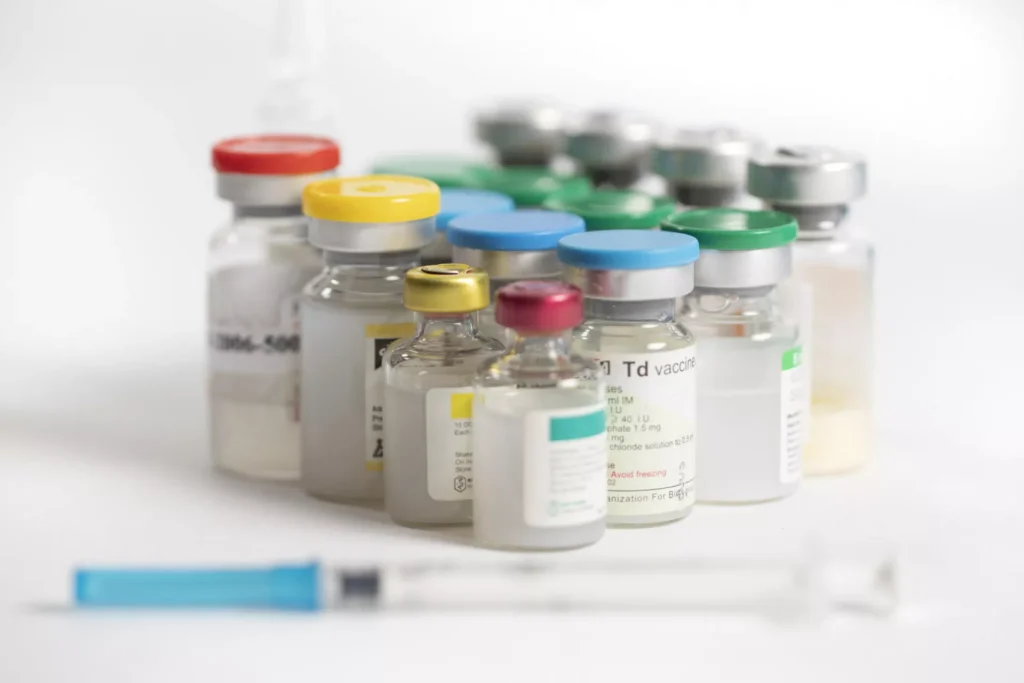This blog goes into great detail about vaccinations, covering what they are, why they matter, how they work, and why they are more important now than ever. This guide will help you understand why vaccines are more than just needles and syringes. They are shields of hope. It is for parents who want to protect their kids, adults who need to catch up on their own shots, or anyone who is interested in public health.
A Brief Overview of Vaccines
Vaccinations are not scary medical experiments; they are just ways to teach your immune system how to fight off disease. Think of your body as a group of people who work together to protect you. It keeps germs, bacteria, and viruses from getting to you every day. But sometimes your immune system needs to practice before the real fight.
Vaccinations are a safe way to do that. They put a harmless version (or part) of a virus or bacteria into your body. Your immune system looks at it, learns how to fight it, and remembers it for later. That way, if you ever get sick with the real disease, your body will be like a trained soldier, ready to fight back and keep you from getting very ill.
Why Vaccinations Are More Than Just a Choice for You
It’s easy to think of Vaccinations as something you do (or don’t do) for yourself. But the truth is that vaccines are beneficial for the health of the whole community. This is where the idea of herd immunity comes into play.
Picture yourself living in a village. The virus can’t spread if most people are vaccinated against it. Vaccines That means that even people who can’t receive the shot, like newborns, pregnant women, or people with weak immune systems, are still safe. It’s like putting a human shield around the most at-risk people in society.
Skipping vaccination endangers you and breaks the protective barrier for everyone else. That’s why Vaccines public health experts say that getting vaccinated is not only your own responsibility but also a social one.
A Short History: The Impact of Vaccines on the World
You can’t discuss Vaccinations without contemplating how they have changed the course of human history. Here Vaccines are a few strong examples:
Smallpox used to be a deadly disease that killed millions of people. Thanks to vaccination campaigns around the world, it was declared eradicated in 1980. The vaccination program is one of the best things that people have ever done.
Polio, a disease that paralyzes kids all over the world, has almost been wiped out. Only a few countries say they have cases today because of Vaccines.
Measles, tetanus, and whooping cough were once deadly diseases that killed many children, but now they can be avoided with regular vaccinations.
Without vaccines, many of us would not be here today. They are the unsung public health heroes because they do their jobs so well.
Vaccinations in Daily Life: From Childhood to Adulthood

Not just kids receive vaccines. You need them at different times in your life:
Vaccines for Kids
Vaccinations are important from the time a baby is born. The pediatrician gives parents a vaccination schedule that includes shots for polio, measles, mumps, rubella, diphtheria, and more. These vaccines are given at the right times to protect kids when they are most at risk, even though it may seem like a lot.
Young Adults and Teens
Vaccination http://Vaccines and immunization with the HPV vaccine is important as kids become teens. This one is forceful; it helps protect against cervical and other cancers caused by the human papillomavirus. Before living with other people, college students may also need booster shots.
Once we turn 18, life doesn’t stop putting our health at risk. As we grow older, our immune systems change, and the protection we had as kids often goes away. Also, new viruses and bacteria are always coming up, and our daily lives—like traveling, working, or even becoming parents—can make us more likely to become sick. Getting vaccines as an adult isn’t about being too careful; it’s about staying healthy, keeping loved ones safe, and avoiding diseases that could make us sick.
Vaccines that every adult should think about getting every day
1. The Shot for the Flu
The flu shot is like a shield for you every year. The flu can make you sick for weeks, even if you’re healthy. If you’re older or have a health problem, it can be even worse. Getting it every year protects not only you but also the people around you.
2. Tdap Booster (Diphtheria, Tetanus, and Whooping Cough)
Do you remember getting a tetanus shot when you were a kid? That protection doesn’t last. Every ten years, adults need a Tdap booster. Parents and grandparents should be extra careful because whooping cough (pertussis) can be dangerous for babies.
3. COVID-19 Vaccines
COVID-19 showed us just how vulnerable adults can be. Staying up to date with your COVID-19 shots and boosters is one of the simplest ways to avoid severe illness and hospital stays.
4. Shingles Vaccine
If you’ve ever heard a friend say, “Shingles was the worst pain of my life,” believe them. This painful rash is caused by the chickenpox virus waking up later in life. The shingles vaccine (recommended for people 50+) is your best defense against it.
5. Pneumococcal Vaccines
Pneumonia is not just a “bad cold”—it can be life-threatening, especially for adults 65+ or those with conditions like asthma, diabetes, or heart disease. Pneumococcal vaccines help prevent serious lung, blood, and brain infections.
Other Vaccines Based on Your Life & Lifestyle
The HPV vaccine protects against cancers that are caused by the human papillomavirus (HPV). The HPV vaccine is most effective when administered early, but it remains beneficial for some adults up to the age of 45.
Hepatitis A & B—Important for travelers, healthcare workers, or anyone with liver conditions.
MMR (Measles, Mumps, Rubella) – If you didn’t get your shots as a child, now’s the time.
Chickenpox vaccine—for adults who never had it (yes, chickenpox in adulthood can be brutal).
Meningococcal vaccine – For college students in dorms, military recruits, or certain travel destinations.
Why This Matters More Than Ever
Getting vaccinated isn’t just about you. It’s about protecting the people you love—your kids, elderly parents, pregnant friends, or even that coworker going through chemotherapy. Vaccines create a ripple effect of protection in your community.
Consider this: each time you vaccinate, you’re not only safeguarding yourself against missed workdays, medical appointments, or severe illnesses, but also contributing to the protection of others who might not have the opportunity to receive vaccinations.
Even adults must take proactive measures! Flu shots, tetanus boosters, shingles vaccines, and COVID-19 boosters are recommended depending on age and health. Vaccination isn’t something you “graduate” from after childhood—it’s a lifelong journey of protection.
Common Myths About Vaccinations (and the Truth)
Myth 1: Vaccines cause autism.
This is one of the most harmful myths, rooted in a discredited study from the 1990s. Countless scientific studies have since proven there’s no link between vaccines and autism.
Misinformation about vaccines spreads faster than viruses occasionally. Let’s dispel the following misconceptions:
Myth 2: Natural immunity is better.
While it’s true that surviving a disease may confer you immunity, it also exposes you to serious risks—hospitalization, long-term complications, or even death. Vaccines offer immunity without suffering.
Myth 3: Too many vaccines overwhelm the immune system.
In reality, your immune system is exposed to countless germs daily. Vaccines are just a tiny fraction of what your body naturally handles.
Myth 4: Healthy people don’t need vaccines.
Even if you’re healthy, you can still carry and spread diseases to others. Vaccination protects not only you but also your loved ones and your community.
Vaccinations in the COVID-19 Era
The COVID-19 http://Vaccinations in the COVID-19 pandemic brought vaccinations into the global spotlight like never before. Suddenly, vaccines weren’t just a medical topic—they became part of everyday conversation, politics, and even family debates.
Despite challenges, COVID-19 vaccines have saved millions of lives worldwide. They’ve shown us the power of modern science and collaboration, but also highlighted the dangers of misinformation and mistrust. If anything, the pandemic reminded us that vaccines are not just about health—they are about resilience, global cooperation, and moving forward as a society.
Emotional Side of Vaccination: Stories That Inspire
Beyond the science, vaccinations carry powerful human stories.
A mother has overcome her fear of her child dying from measles.
An elderly man experiences a sense of security when embracing his grandchildren following a flu vaccination.
A nurse observes a decrease in the number of children admitted to hospitals due to the silent impact of vaccines.
These stories remind us that vaccines are not just about numbers and data—they’re about real people living safer, healthier lives.
The Future of Vaccines: What’s Coming Next?
The science of vaccination continues to evolve. Researchers are working on vaccines for diseases like HIV, malaria, and even certain types of cancer. mRNA technology, which was key in COVID-19 vaccines, is opening new doors in medical research.
Imagine a future where more deadly diseases become preventable, where a simple shot could protect us from illnesses that today seem unbeatable. That’s the promise of vaccines.
How to Approach Vaccinations with Confidence
If you or someone you love feels nervous about vaccines, here are some tips:
Ask questions. Talk to a trusted doctor or healthcare provider rather than relying on random internet posts.
Look at credible sources. The World Health Organization (WHO) and Centers for Disease Control (CDC) provide reliable, science-based information.
Remember the bigger picture. Vaccination is not just about you—it’s about protecting your family, neighbors, and community.
Focus on hope, not fear. Vaccines are about prevention, not panic.
Final Thoughts: Vaccines as Acts of Love
At the end of the day, vaccinations are about love. Love for yourself, love for your children, and passion for the community around you are the driving forces behind vaccinations. They represent humanity’s ability to fight back against invisible threats and protect future generations.
Therefore, the next time you prepare for a vaccination, keep in mind that it’s more than just receiving a vaccine. You’re participating in one of the most powerful health movements in history.
Vaccinations are more than medical interventions. They are shields of protection, stories of hope, and promises of a healthier tomorrow.
Read More: http://Quick Tips on Business, Tech & Lifestyle | Envyglide.com
Read More: Phoebe Dynevor: From Manchester Roots to Global Stardom




